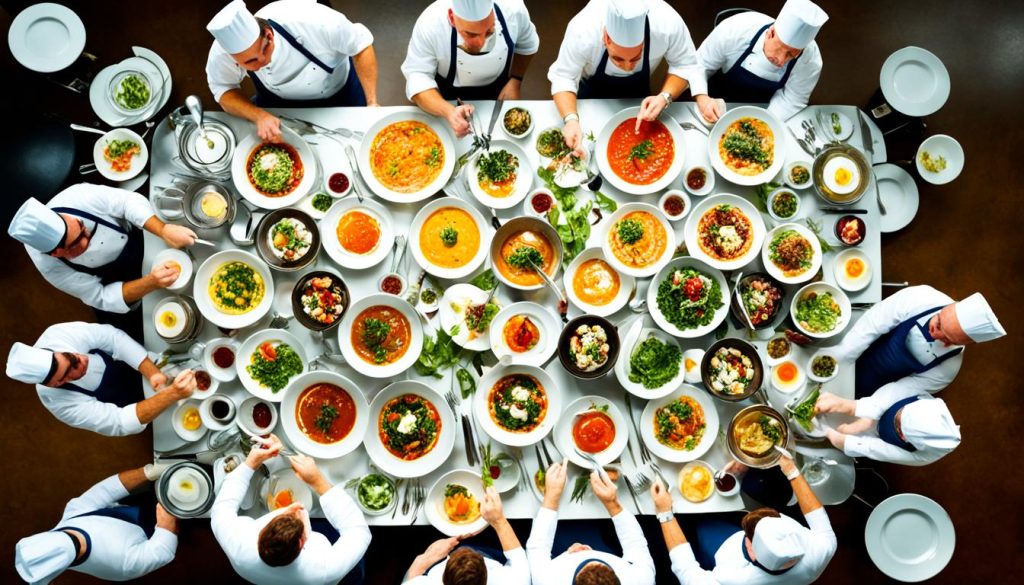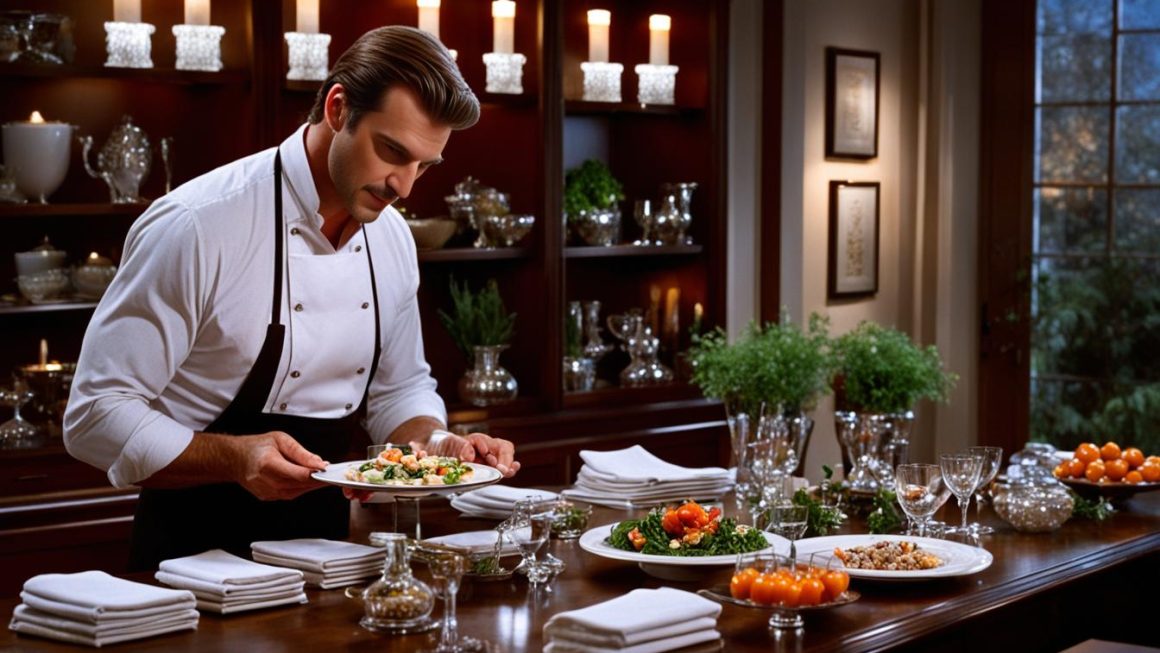If you have a passion for food and writing, becoming a food critic could be the perfect career choice for you. As a food critic, you’ll have the opportunity to taste delicious dishes, explore culinary experiences, and share your insights with the world. In this guide, we will take you through the steps to becoming a food critic, from formal training to building your skills and finding job opportunities.
Key Takeaways:
- Formal training and education in journalism or culinary arts can help you stand out in the field of food criticism.
- Creating your own content through a food blog or contributing to publications can showcase your writing skills and credibility.
- Seeking professional writing experience through entry-level jobs and networking opportunities is crucial for your career growth.
- Developing a strong network of chefs, hospitality professionals, and other journalists can provide valuable industry insights and opportunities.
- Joining associations and organizations for food critics can offer networking, resources, and professional development opportunities.
What is a Food Critic?
A food critic is a writer who specializes in providing thoughtful commentary on their experiences dining out. They visit restaurants, sample the food, and report on their experience, not just on the food itself but also on the ambiance and service. Food critics serve as a connection between diners and restaurants, providing unbiased reviews and up-to-date information about food trends. Their work affects both diners and restaurants, helping diners make informed choices and offering exposure to restaurants.
Food critics play a vital role in the culinary industry, shaping the dining experiences of millions of people. By sharing their detailed assessments and recommendations, they guide diners towards memorable culinary adventures and assist restaurants in improving their offerings.
When you think of a food critic, you may also envision a restaurant critic. While the terms are often used interchangeably, restaurant critics typically focus more on reviewing specific restaurants and their overall dining experiences, while food critics may have a broader scope, exploring different food establishments and offering insights on various culinary topics like food trends, dining etiquette, and gastronomic culture.
Through their expert analysis and eloquent storytelling, food critics inspire curiosity, educate diners, and encourage them to step out of their comfort zones to explore new flavors and cuisines. A good food critic understands the nuances of taste, the importance of presentation, and the impact of service, and effectively communicates these elements to their readers.
In the next section, we’ll delve into the steps involved in becoming a food critic, so you can embark on your own culinary career journey.
Steps to Becoming a Food Critic
While there is no defined career path to becoming a food critic, here are four steps that can form the basis of your plan:
- Seek Formal Training to Stand Out from the Crowd: Consider getting a degree in journalism or a related field to enhance your writing skills. Alternatively, attending culinary school can provide valuable hands-on experience and a deeper understanding of the food industry.
- Create Your Own Content to Build Skills and Credibility: Start a food blog or contribute to existing publications to showcase your writing style and expertise. This will help you establish your voice and build a portfolio that demonstrates your passion for food critique.
- Get Your Foot in the Door as a Professional Writer: Look for writing opportunities in newspapers, magazines, and online outlets to gain experience and exposure. Writing about food and restaurants will help you refine your skills and expand your network in the industry.
- Remain Committed to Growing Your Network and Cultivating Your Skills: Build relationships with chefs, hospitality professionals, and other journalists who can offer valuable insights and opportunities. Attend educational courses, workshops, and industry events to stay up-to-date with the latest trends and continuously improve your knowledge and abilities as a food critic.
By following these steps, you can pave the way towards a successful career as a food critic and provide valuable insights to fellow food enthusiasts and passionate diners.
| Pros | Cons |
|---|---|
| + Opportunity to try a variety of cuisines | – Being open to trying unusual foods |
| + Attending food events and building a network in the industry | – Potential weight gain from excessive eating |
| + Making a positive impact on diners’ choices | – Risk of food poisoning |
| + Potential exposure and recognition for your work | – Potential damage to businesses from negative reviews |
| + Expressing creativity and passion for food through writing | – Meeting deadlines and handling criticism |
Attributes of a Food Critic
Being a food critic requires a unique set of qualities and skills. To truly excel in this role, you need to possess the following attributes:
A Love of Food and a Broad Palate
A genuine passion for food is at the heart of being a food critic. You should have a deep appreciation for different cuisines and flavors. An adventurous palate allows you to explore diverse culinary experiences and provide insightful commentary.
Knowledge of Different Cuisines
As a food critic, it’s essential to have a well-rounded understanding of various cuisines. This knowledge helps you appreciate the cultural context of different dishes and enables you to provide meaningful insights to your readers.
Excellent Communication Skills
Effective communication skills are vital for a food critic. You must be able to articulate your thoughts and experiences clearly, both in written form and verbally. Crafting engaging and informative reviews requires the ability to capture the essence of a dining experience and convey it to your audience.
Integrity and Impartiality
A good food critic remains impartial and unbiased in their reviews. Maintaining integrity is crucial to earning the trust of your readers. Your reviews should reflect your honest opinions and experiences, free from personal biases or external influences.
Willingness to Push Boundaries
As a food critic, you should be open to trying new and unfamiliar foods. Embracing different ingredients, cooking techniques, and culinary concepts expands your horizons and allows you to provide diverse perspectives in your reviews.
Curiosity and Open-Mindedness
Having a curious and open-minded approach allows you to continually discover new culinary experiences. Embrace the opportunity to explore dining establishments, savor unique flavors, and engage with the ever-evolving world of food.
Background in the Food Industry or Formal Writing Training
A background in the food industry or formal training in writing can provide valuable insights and skills to enhance your role as a food critic. Experience working in restaurants, culinary schools, or obtaining a writing-related education can give you a deeper understanding of the industry and improve your ability to communicate effectively.
| Qualities of a Food Critic | Skills of a Food Critic |
|---|---|
| Passion for food | Excellent communication |
| Broad palate | Integrity and impartiality |
| Knowledge of different cuisines | Willingness to push boundaries |
| Curiosity and open-mindedness | |
| Background in food industry or formal writing training |
Seek Formal Training to Stand Out from the Crowd
While not necessary, formal training can help enhance your skills and credibility as a food critic. Consider getting a degree in journalism or a related field to improve your writing abilities. Culinary school can also offer valuable experiences and resources, such as exposure to different cuisines, language to describe ingredients and flavors, and connections with mentors in the food industry.
The Benefits of Formal Training
Formal training gives you a solid foundation in writing and culinary knowledge, setting you apart from other aspiring food critics. With a journalism degree, you’ll develop essential skills like researching, interviewing, and crafting compelling narratives. Culinary school, on the other hand, exposes you to the intricacies of food preparation, presentation, and flavor profiles. Both paths provide unique advantages that can strengthen your expertise and give you a competitive edge in the industry.
Journalism Degree: Master the Art of Writing
Obtaining a journalism degree equips you with the necessary tools to excel in the field of food criticism. Through coursework in reporting, feature writing, and media ethics, you’ll learn how to effectively communicate your insights and evaluations to a wide audience. In addition, you’ll gain valuable skills in conducting interviews with chefs and industry professionals, researching food trends, and producing engaging content that captures the readers’ attention.
Culinary School: Deepen Your Understanding of Food
Incorporating culinary school into your formal training can give you a deeper understanding of the art and science of food. You’ll explore a variety of cooking techniques, learn about different cuisines, and develop a sophisticated palate for flavors. Culinary school also provides practical experience in recipe development, food presentation, and menu planning, enabling you to evaluate dishes with a more comprehensive perspective.
Writing Workshops: Refine Your Craft
In addition to formal education, consider attending writing workshops focused on food writing or restaurant criticism. These workshops provide a platform for honing your skills, receiving feedback from experienced writers, and learning from industry professionals. The interactive environment allows you to refine your writing style, explore different writing techniques, and gain valuable insights from peers in the industry.
| Formal Training Options | Key Benefits |
|---|---|
| Journalism degree |
|
| Culinary school |
|
| Writing workshops |
|
Create Your Own Content to Build Skills and Credibility
One of the most effective ways to build your skills and establish credibility as a food critic is to create your own content. Starting your own food blog or contributing to existing publications allows you to showcase your writing abilities and develop a unique voice in the industry.
Consistently producing content on your food blog or contributing articles to reputable publications not only helps you practice your writing skills but also allows you to share your thoughts and experiences on dishes and restaurants with a wide audience. This consistent output helps you build a strong portfolio that demonstrates your expertise and credibility to potential employers.
“Creating your own content through a food blog or guest writing for established publications allows you to showcase your writing abilities and voice, building a portfolio that highlights your expertise.” – Food Critic Pro
When starting your food blog, focus on developing a unique perspective and voice in your writing. Share your own culinary adventures, review restaurants and dishes, and provide valuable insights and recommendations to your readers. Remember, building credibility takes time, consistency, and a commitment to delivering high-quality content.
To gain more exposure and make valuable connections, consider submitting your food writing to other established blogs or publications. This allows you to tap into their existing audience and build relationships with fellow writers and industry professionals.
Benefits of Creating Your Own Content:
- Showcase your writing skills and expertise
- Develop a unique voice and perspective
- Build a portfolio of your food writing
- Gain exposure and make connections in the industry
By creating your own content, whether through a food blog or by contributing to other publications, you have the opportunity to demonstrate your skills, credibility, and passion for food writing. This can significantly enhance your chances of success as a food critic.
| Image | Caption |
|---|---|
| Build your skills and credibility by creating your own food content |
Get Your Foot in the Door as a Professional Writer
If you aspire to become a food critic, gaining professional writing experience is essential. One way to kick-start your career is by looking for writing jobs in newspapers, magazines, and online outlets. While landing a food writing job at a renowned publication may not be immediately attainable, starting with an entry-level writing position can open doors to future opportunities in food criticism.
By securing writing jobs in the industry, you can gain valuable professional experience and sharpen your skills as a food writer. Even if these roles may not be directly related to food criticism, they provide an opportunity to develop your writing abilities and build a strong portfolio. Your dedication to writing and your commitment to honing your craft will impress potential employers searching for food critics.
When applying for food critic positions, having professional writing experience in addition to your food blog and culinary school background can make your resume stand out from the competition. Employers value candidates who possess a combination of writing expertise and culinary knowledge, making you a more desirable candidate for the role.
Don’t underestimate the power of entry-level writing jobs in your journey to becoming a food critic. These positions provide a solid foundation, enabling you to refine your writing style, expand your knowledge of the food industry, and establish your professional reputation. From there, you can gradually work your way up and gain the necessary experience to thrive as a food critic.
Remain Committed to Growing Your Network and Cultivating Your Skills
Building relationships with chefs, hospitality professionals, and other journalists is crucial for staying current and learning about opportunities in the industry. Networking for food critics allows you to exchange ideas, collaborate on projects, and gain valuable insights from experienced professionals. Attending food events is a great way to meet like-minded individuals and expand your network. These events provide opportunities to connect with influential figures in the culinary world, discover emerging trends, and sample new flavors.
To enhance your expertise and stay ahead in the fast-paced world of food criticism, continuing education is essential. Taking courses or attending workshops specifically designed for food critics can sharpen your skills, deepen your knowledge, and introduce you to innovative approaches. Look out for training programs that cover topics like culinary trends, food writing techniques, and restaurant analysis. This ongoing learning will empower you to provide more thorough and insightful reviews.
Listening to food podcasts is another valuable way to stay informed and learn from industry experts. Podcasts offer a convenient way to stay updated on the latest food trends, gain inspiration for your own work, and hear insightful interviews with renowned chefs and food writers. Additionally, attending conferences and industry events can provide unique opportunities to engage with influential personalities, participate in panel discussions, and expand your horizons through engaging workshops and keynote speeches.
Associations and Organizations for Food Critics
Networking and professional development opportunities are essential for food critics to thrive in their careers. There are several associations and organizations dedicated to supporting food critics and providing valuable resources. Some prominent associations and organizations for food critics include:
- The Association of Food Journalists (AFJ)
- The International Association of Culinary Professionals (IACP)
- The James Beard Foundation
- The World Association of Chefs Societies (WACS)
- The Guild of Food Writers
These associations offer a wide range of benefits for food critics, such as:
- Access to industry publications and resources
- Job listings and career opportunities
- Awards and recognition for excellence in food writing
- Conferences and networking events to connect with other professionals
By joining these associations, food critics can stay updated on the latest industry trends, expand their professional networks, and gain valuable insights and support from fellow food critics.
Networking is an essential aspect of building a successful career as a food critic. These associations provide excellent opportunities to connect with chefs, restaurant owners, and other influential figures in the culinary world. The networking events offered by these organizations enable food critics to form meaningful connections, collaborate on projects, and stay up-to-date with developments in the industry.

| Association/Organization | Benefits |
|---|---|
| Association of Food Journalists (AFJ) | Access to industry publications, job listings, and awards. |
| International Association of Culinary Professionals (IACP) | Networking events, conferences, and access to resources. |
| James Beard Foundation | Recognitions, awards, and access to culinary events. |
| World Association of Chefs Societies (WACS) | Networking with chefs, educational resources, and certifications. |
| Guild of Food Writers | Professional development, workshops, and networking opportunities. |
Online Resources for Food Critics
As a food critic, it’s essential to stay up-to-date with the latest trends, discover new restaurants, and find inspiration for your reviews. Luckily, there are several online resources tailored specifically for food critics. These websites offer a wealth of information, including restaurant reviews, recipes, and food-related content. By leveraging these platforms, you can enhance your knowledge, gather valuable insights, and connect with a wider community of food enthusiasts.
Restaurant Review Websites
When it comes to finding information about restaurants, there are several prominent websites that cater to food critics. These platforms provide comprehensive coverage of the culinary scene, offering in-depth reviews, top-rated establishments, and curated lists of recommended restaurants. Some popular restaurant review websites include:
- Eater
- Zagat
- Michelin Guide
- Grub Street
- Bon Appétit
- Saveur
These websites offer a diverse range of content, from industry news and current trends to detailed guides that help you discover hidden culinary gems.
Food Critic Websites and Platforms
In addition to restaurant review websites, there are platforms specifically designed for food critics. These resources offer a wealth of content related to restaurant recommendations, reviews, and food culture. By leveraging these platforms, you can explore new restaurants, read fellow food critics’ reviews, and engage with the broader food-loving community. Some popular food critic websites and platforms include:
- The Infatuation
- Food Republic
- Plate
- Chef’s Feed
These platforms provide a curated selection of restaurant recommendations, food-focused articles, and expert reviews to help you stay informed and inspired in your food criticism journey.
Online Magazines
Online magazines serve as valuable resources for food critics, offering a mix of articles, recipes, interviews, and features on the culinary world. These publications provide a platform for food critics to share their work, discover new talent, and gain exposure. Some popular online magazines for food critics to explore include:
- Tasting Table
- Food & Wine
These online magazines cover various aspects of the food industry, from food trends and chef profiles to recipe inspiration and insider tips.
By utilizing these online resources, food critics can expand their knowledge, find inspiration, and stay connected to the ever-evolving culinary landscape. Remember, staying informed and engaged with the food community is essential for sharpening your skills and providing valuable insights to your audience.
What Does a Food Critic Do?
As a food critic, you have the responsibility of visiting various food establishments to evaluate and analyze the dishes and beverages they offer. Your role is to assess the taste, quality, portion size, and presentation of the food, ensuring that each aspect meets the highest standards. However, your evaluation doesn’t stop at the food itself. You also take into consideration the overall dining experience, including factors like ambiance and service.
Once you’ve gathered all the necessary information, it’s time to share your insights and experiences with the public. You have the option to publish your reviews through written articles, blogs, videos, or podcasts. The goal is to provide valuable information that helps people make informed dining choices.
Being a food critic also involves staying up-to-date with food trends, attending events, and working closely with publications and stakeholders in the food industry. This ensures that you have a comprehensive understanding of the culinary landscape and are able to provide accurate and relevant content to your audience.
Overall, the tasks of a food critic include:
- Evaluating and analyzing various dishes and beverages
- Assessing the taste, quality, portion size, and presentation of the food
- Considering the overall dining experience, including ambiance and service
- Sharing reviews and experiences through articles, blogs, videos, or podcasts
- Keeping up with food trends
- Attending events and industry functions
- Working with publications and stakeholders in the food industry
By performing these duties, you are not only an influential voice in the culinary world but also an essential resource for diners seeking honest and reliable information about their dining experiences.
Responsibilities of a Food Critic
As a food critic, you have a range of responsibilities that contribute to your role as an influential voice in the culinary world. By staying updated on food trends, tasting and evaluating food and drinks, reviewing the overall dining experience, and providing accurate and engaging content for publications, you can shape the perception of restaurants and help diners make informed choices.
To fulfill your duties effectively, you must possess a diverse skill set and be willing to engage in various tasks. Some of the key responsibilities of a food critic include:
- Staying updated on food trends: It’s crucial to keep abreast of the latest culinary trends, as well as emerging ingredients and techniques. This allows you to provide relevant and timely insights to your audience.
- Tasting and evaluating food and drinks: To provide objective and comprehensive reviews, you must have a discerning palate and the ability to evaluate dishes based on taste, presentation, creativity, and quality.
- Reviewing the overall dining experience: In addition to assessing the food itself, you should also consider other factors that contribute to the overall dining experience. This includes evaluating the ambiance, service, cleanliness, and value for money.
- Providing accurate and engaging content for publications: Your role as a food critic involves writing compelling and informative reviews that capture the essence of the dining experience. Your content should be accurate, well-researched, and engaging to captivate your readers.
- Taking photographs of dishes: Visuals play a crucial role in food reviews. As a food critic, you may be responsible for capturing high-quality photographs of dishes to accompany your written reviews.
- Attending promotional events and launches: Being an active participant in the food industry means attending events, such as restaurant openings, product launches, and culinary festivals. This allows you to stay connected with industry professionals and discover new culinary experiences.
- Meeting publishing deadlines: To maintain consistency and professionalism, you must adhere to publishing deadlines set by your employer or publication. This ensures that your reviews reach your audience in a timely manner.
- Maintaining relationships with stakeholders: Building and nurturing relationships with chefs, restaurant owners, and other stakeholders in the food industry is essential. These connections can provide valuable insights, exclusive access, and collaboration opportunities.
Your attention to detail, objectivity, and dedication to your craft will contribute to your effectiveness as a food critic. By fulfilling these responsibilities, you can provide valuable evaluations, influence culinary trends, and guide both diners and restaurants towards excellence.

Pros and Cons of Being a Food Critic
Becoming a food critic offers a range of benefits and drawbacks that are important to consider. Let’s explore the positive aspects and challenges of being a food critic.
Benefits of Being a Food Critic
- Opportunity to try different cuisines: As a food critic, you have the privilege of exploring a wide variety of culinary delights, from traditional dishes to innovative creations. It allows you to expand your palate and appreciate the diversity of flavors.
- Attending events and experiencing new flavors: Food critics often receive invitations to exclusive food events, tastings, and launches. These experiences offer unique opportunities to discover new recipes, meet renowned chefs, and stay current with the latest food trends.
- Making a positive impact on diners’ choices: Your reviews and recommendations can influence people’s dining decisions, helping them discover exceptional restaurants and inspiring memorable culinary experiences.
- Benefiting food businesses: Positive reviews can help boost the reputation and visibility of restaurants, attracting more customers and contributing to their success. Your expertise and recognition can be valuable assets to the food industry.
Drawbacks of Being a Food Critic
- Being open to trying unusual foods: As a food critic, you may encounter unconventional ingredients and dishes that push your culinary boundaries. It requires a willingness to step outside your comfort zone and remain open-minded.
- Potential weight gain from excessive eating: Constantly indulging in delicious meals can lead to weight gain and affect your overall health. It’s essential to maintain a balanced approach and prioritize mindful eating habits.
- Risk of food poisoning: When trying various dishes and visiting different restaurants, there is always a certain level of risk associated with food safety. Food critics should take necessary precautions and be vigilant to minimize these risks.
- Potential damage to businesses from negative reviews: While honest criticism can be valuable, negative reviews can harm the reputation and livelihood of food establishments. It requires sensitivity and fair judgment to provide constructive feedback without causing undue harm.
- Mental demands of meeting deadlines and handling criticism: Being a food critic involves managing deadlines for writing articles, maintaining an active online presence, and facing criticism from both readers and restaurant owners. It necessitates resilience, effective time management, and the ability to handle feedback constructively.
Being a food critic offers exciting opportunities to explore the culinary world, make an impact, and indulge in fantastic dining experiences. However, it also comes with challenges that require professionalism, balance, and a deep passion for food. Consider these pros and cons carefully as you embark on your journey as a food critic.
Personal Qualities of a Food Critic
Being a successful food critic requires a unique set of personal qualities and skills that allow you to effectively evaluate and critique culinary experiences. Whether you’re just starting your journey as a food critic or looking to enhance your existing skills, here are some essential qualities to cultivate:
- Passion for Food and Writing: A genuine love for food and a natural talent for writing are the foundational qualities of a food critic. Your passion will drive you to explore diverse cuisines, flavors, and culinary trends, as well as to communicate your experiences and insights effectively through your writing.
- Excellent Communication Skills: As a food critic, you must possess strong written and verbal communication skills. Articulating your impressions and conveying them in a clear, engaging, and descriptive manner is crucial for providing valuable and informative reviews that resonate with your audience.
- Knowledge of the Food Industry: A deep understanding of the food industry, including its history, techniques, ingredients, and cultural significance, allows you to provide informed and insightful critiques. Stay up-to-date with the latest culinary trends, industry news, and emerging chefs to establish yourself as a reputable authority in the field.
- Creativity: Developing a unique voice and perspective as a food critic requires creativity. Approach each dining experience with a fresh and open mind, seeking out new and innovative flavors, textures, and presentations. Embrace the opportunity to explore and experiment with different culinary concepts.
- Critical Thinking: Food critics must possess strong analytical and critical thinking skills to objectively evaluate dishes, flavors, and overall dining experiences. The ability to identify strengths and weaknesses, recognize nuances, and construct well-reasoned arguments enables you to provide constructive and valuable feedback.
- Networking Abilities: Building and maintaining relationships with chefs, restaurateurs, fellow food critics, and other industry professionals is essential for staying connected and up-to-date with the culinary landscape. Networking provides opportunities for collaboration, exchange of ideas, and access to exclusive dining experiences.
- Time Management Skills: Managing deadlines and maintaining a consistent publishing schedule is crucial for a food critic. You need to balance visiting different restaurants, conducting thorough evaluations, and delivering timely reviews to your audience, while also meeting the demands of other writing commitments you may have.
- Attention to Detail: A meticulous eye for detail allows you to capture and appreciate the subtleties of a dish, from its presentation and plating to the precise use of ingredients and flavors. Paying attention to the small details ensures that your reviews are comprehensive and nuanced.
- Broad Palate: Developing a broad palate is essential for a food critic. Cultivate your ability to discern and appreciate different flavors, textures, and combinations. Train your taste buds to recognize distinctive elements and understand how they contribute to the overall dining experience.
- Ability to Work Under Pressure: Being a food critic often involves working in fast-paced environments, attending multiple events, and juggling numerous responsibilities. The ability to remain calm, focused, and adaptable under pressure is crucial for successfully managing and fulfilling your duties as a critic.
Mastering these personal qualities will enable you to navigate the world of food criticism with confidence and skill, providing valuable insights and guidance to both diners and the culinary industry.
Conclusion
Becoming a food critic is an exciting and rewarding career choice for those who have a passion for food and writing. By following the steps outlined in this food critic career guide, you can set yourself on the path to success. Seek formal training to enhance your skills and credibility, create your own content to showcase your abilities, gain professional writing experience, and continuously grow your network and skills.
Embrace the challenges that come with being a food critic and enjoy the journey of exploring the culinary world. Your valuable insights and reviews will not only help diners make informed choices but also contribute to the success and growth of the food establishments you critique. Remember, a combination of passion, knowledge, and skill will pave the way for a successful career as a food critic.
So, if you have a love for food, a way with words, and a curiosity to explore new culinary experiences, becoming a food critic may be the perfect career for you. Take the first step today and embark on a fulfilling journey of critiquing the world of gastronomy.



